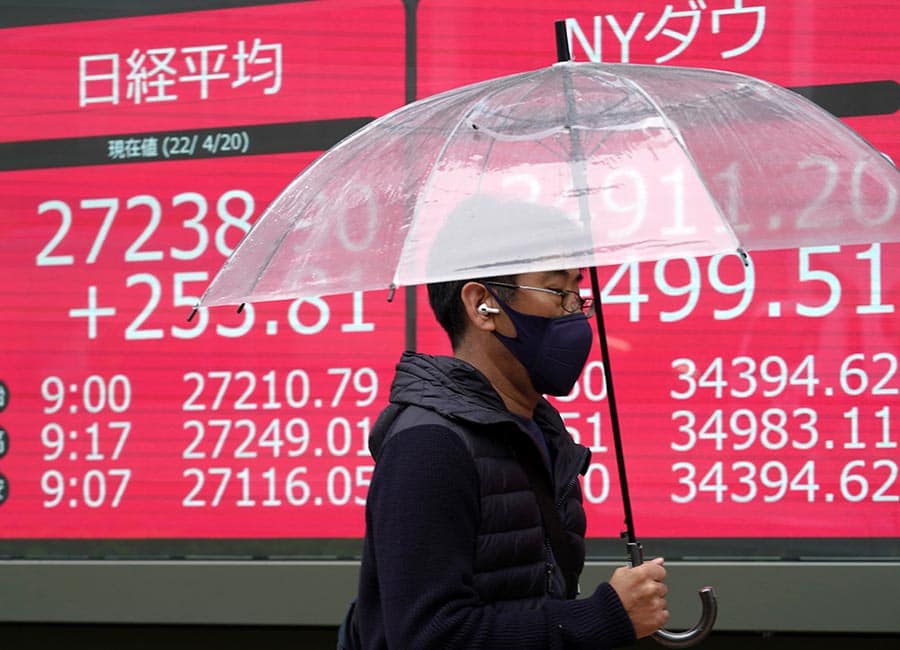European stocks advanced on Wednesday after a mixed session in Asia, where authorities in Shanghai allowed 4 million people to leave their homes, easing a stringent shutdown that has deepened worries over the slowing Chinese economy
Germany's DAX rose 0.9% to 14,280.77 while the CAC 40 in Paris climbed 1.2% to 6,612.76. Britain's FTSE 100 gained 0.5% to 7,637.19. The future for the S&P 500 was unchanged and that for the Dow industrials edged less than 0.1% higher.
Markets have powered higher even as the conflict in Ukraine has heated up in recent days.
Russia was pounding Ukrainian cities and towns and pouring more troops into the war as it pursued a fresh offensive that seeks to slice the country in half in a battle for control of the country's eastern industrial heartland of coal mines and factories.
Health officials in Shanghai said a major outbreak of coronavirus was "under effective control" in some parts of the city of 25 million, China's business capital and home to its largest port.
Almost 12 million people have been allowed to go outdoors following a first round of easing last week.
The International Monetary Fund cut its forecast of Chinese economic growth, to 4.4% from last year's 8.1%, and warned the global flow of industrial goods might be disrupted by zero-COVID controls that confined residents of Shanghai and dozens of other cities to their homes, some for weeks.
Also Wednesday, the dollar remained at a 20-year high against the Japanese yen, at 128.01 yen to the dollar. The weaker yen reflects a divergence between rising interest rates in the U.S., where the Federal Reserve is seeking to tamp down inflation, and unchanged rates in Japan, where the central bank has kept its key rate at minus 0.1% for years.

Japanese exports are more competitive overseas and corporate profits are fatter when converted from dollars to yen when the yen is weak. But a weaker yen raises costs of imports both for consumers and businesses.
Japan reported its trade deficit persisted in March as imports surged 31% thanks to soaring oil prices and a weakening yen. The deficit of 412 billion yen ($3.2 billion) was quadruple analysts' estimates and a reversal from a surplus of 615 billion yen in March 2021.
In Asian trading, Tokyo's Nikkei 225 index gained 0.9% to 27,217.85 while the Kospi in South Korea was almost unchanged at 2,718.69.
The Hang Seng index in Hong Kong lost 0.4% to 20,944.67 and the Shanghai Composite index slipped 1.4% to 3,174.35 after regulators kept a key interest rate unchanged, foiling hopes for it might be cut to help encourage more lending.
In Sydney, the S&P/ASX 200 picked up 0.1% to 7,569.20. India's Sensex gained 1% while the SET in Bangkok rose 0.3%.
On Tuesday, stocks overcame a weak start to finish broadly higher, giving the major indexes on Wall Street their best day in nearly five weeks.
The S&P 500 rose 1.6%, the Dow Jones Industrial Average rose 1.5% and the tech-heavy Nasdaq added 2.2%.
Stocks have mostly struggled this year amid uncertainty over how the economy and Corporate America will be affected as the Federal Reserve moves to reverse low-interest rate policies that helped markets soar in recent years.
Investors are focusing on the current round of corporate report cards as more big companies release their earnings. Railroad giant CSX will report earnings on Wednesday, along with Tesla. American Airlines and Union Pacific will report their results on Thursday.
+Additional reporting AP









